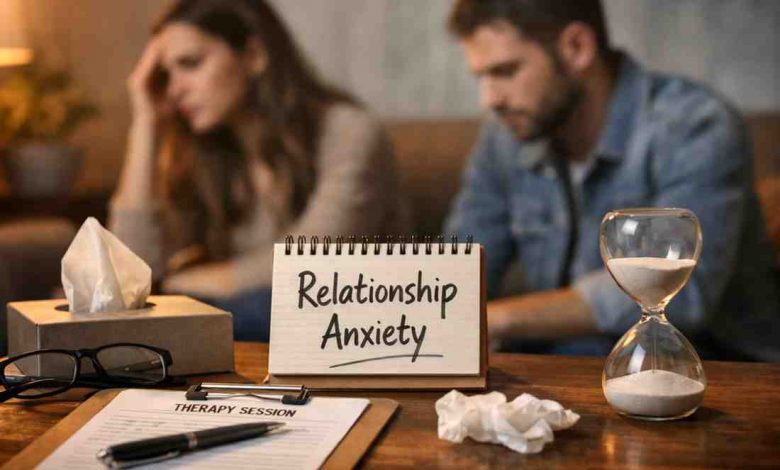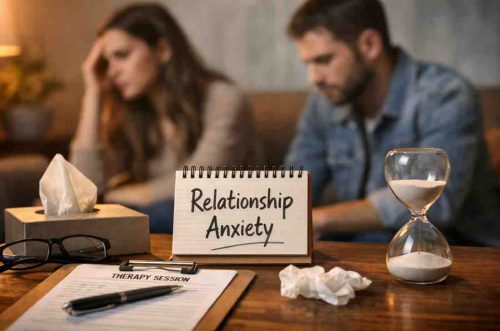

I’ve watched so many people sit across from me — shaking their leg, staring at their phone, rereading a text from their partner for the tenth time — and whisper, “I think something is wrong with me.”
Most of them don’t think they need therapy. They think they just need reassurance. Or better communication. Or a different partner.
But after seeing this pattern repeat across different ages, careers, personalities, and relationship stages, I can say this clearly:
Therapy for Relationship Anxiety isn’t about fixing your partner. It’s about calming a nervous system that thinks love equals danger.
And almost everyone I’ve worked with messes this up at first.
They try to solve anxiety with logic.
It rarely works.
What I Keep Seeing in People Who Search for Therapy for Relationship Anxiety
From what I’ve seen, people don’t look for help because they’re “crazy.” They look for it because they’re exhausted.
Common pattern:
-
Overthinking small shifts in tone
-
Needing constant reassurance
-
Fear of being abandoned — even in stable relationships
-
Testing their partner without realizing it
-
Picking fights just to feel closeness afterward
-
Breaking up impulsively to avoid being left first
And here’s the part that surprised me after watching so many people try to fix this alone:
They’re often dating good people.
Supportive partners. Stable partners. People who actually care.
But their body reacts like they’re about to be betrayed.
That disconnect — between reality and reaction — is where therapy for relationship anxiety actually becomes useful.
Why Most People Try to “Fix It” The Wrong Way First
I didn’t expect this to be such a common issue, but almost everyone I’ve seen struggle with this does this one thing wrong:
They focus on controlling the relationship instead of regulating themselves.
Here’s what that looks like:
-
Asking for reassurance repeatedly
-
Checking social media for “clues”
-
Overanalyzing every text
-
Demanding clarity constantly
-
Threatening to leave when they feel insecure
On paper, these behaviors look like communication.
In practice? They fuel anxiety.
Because reassurance works for about 20 minutes.
Then the anxiety comes back louder.
Therapy for Relationship Anxiety, when it’s done well, shifts the focus from:
“Are they going to leave me?”
to
“Why does my body panic when nothing is actually happening?”
That shift changes everything.
What Therapy for Relationship Anxiety Actually Works On
Let’s strip away the vague language.
Here’s what I’ve consistently seen therapy address effectively:
1. Nervous System Hyperactivation
Most relationship anxiety isn’t cognitive. It’s physiological.
People describe:
-
Tight chest
-
Racing thoughts
-
Urge to text immediately
-
Fear spikes when partner is quiet
When therapy focuses on body-based regulation (breathing work, grounding, attachment rewiring), people stabilize faster.
This honestly surprised me. The biggest breakthroughs often happen when people stop debating their thoughts and start calming their body.
2. Attachment Patterns
I’ve seen avoidant partners trigger anxious partners.
I’ve seen anxious partners choose emotionally unavailable people repeatedly.
Therapy helps identify:
-
Why you’re drawn to certain dynamics
-
Why calm love feels “boring”
-
Why chaos feels like chemistry
And this is where real progress happens.
Because once someone sees the pattern, they can’t unsee it.
3. Core Fear Scripts
Underneath the anxiety is usually one sentence:
“I’m not enough.”
“I’ll be abandoned.”
“I’m too much.”
Therapy for relationship anxiety works when it helps rewrite that script.
Not with affirmations.
With lived emotional correction.
That takes time.
How Long Does Therapy for Relationship Anxiety Take?
People always ask this.
Short answer:
Most people start noticing subtle shifts in 4–8 weeks.
But full rewiring? Often 3–6 months.
From what I’ve seen:
-
Weeks 1–3: Awareness increases. Anxiety might spike.
-
Weeks 4–8: You start catching spirals earlier.
-
Months 3+: Real behavioral change begins.
-
After 6 months: Relationships feel quieter. Less dramatic.
But here’s the truth nobody likes:
Progress isn’t linear.
One argument can make someone feel like they’re back at square one.
They’re not.
They’re just triggered.
Common Mistakes I’ve Seen People Make in Therapy
Almost everyone I’ve seen struggle with this does at least one of these:
❌ Using Therapy to Validate Their Fear
They want the therapist to confirm:
“Yes, your partner IS pulling away.”
Sometimes that’s true.
Often, it’s projection.
❌ Quitting When Anxiety Doesn’t Disappear Immediately
Therapy regulates patterns.
It doesn’t erase emotions.
Big difference.
❌ Staying With the Wrong Therapist
If therapy for relationship anxiety turns into:
“Just communicate more.”
That’s not deep work.
You need someone who understands attachment and nervous system dynamics.
❌ Expecting Their Partner to Change First
This one is huge.
I’ve watched people wait months for their partner to adjust… while avoiding their own work.
It stalls everything.
Is Therapy for Relationship Anxiety Worth It?
From what I’ve seen?
If your anxiety is:
-
Affecting sleep
-
Causing repeated fights
-
Leading to breakups
-
Making you feel ashamed
-
Creating obsession-level rumination
Yes.
But here’s who might hate it:
-
People who want quick reassurance
-
People unwilling to examine childhood patterns
-
People who want their partner “fixed”
-
People not ready to sit with discomfort
Therapy requires sitting in uncertainty without acting impulsively.
That’s hard.
Really hard.
But the payoff?
Emotional stability inside love.
And that’s rare.
What Typically Surprises People the Most
This honestly caught me off guard the first few times I saw it:
When someone’s anxiety reduces, their relationship often improves automatically.
Less testing.
Less accusation.
Less emotional volatility.
Partners relax.
Connection grows.
Not because the partner changed.
But because the anxious reactions stopped escalating.
It’s subtle.
But powerful.
Short FAQ (Straight Answers)
Can therapy completely cure relationship anxiety?
No. But it can reduce intensity and frequency dramatically.
What if my partner is actually avoidant?
Then therapy helps you decide if that dynamic is sustainable — instead of reacting from panic.
Does couples therapy work better?
Sometimes. But individual therapy is often necessary first.
Can I do this without therapy?
Some people can with structured attachment work. Many struggle alone.
Is relationship anxiety a red flag?
Not by itself. It’s common. It becomes a problem when unmanaged.
Objections I Hear All the Time
“I don’t want to feel dependent on therapy.”
Therapy should build independence, not dependence. If it’s done right, you’ll rely on it less over time.
“What if I discover my relationship isn’t right?”
Then that clarity is useful. Avoiding it doesn’t make it disappear.
“I’m scared therapy will make me overanalyze more.”
Bad therapy can. Good therapy grounds you.
Reality Check: When Therapy for Relationship Anxiety Might Not Help
Let’s be honest.
Therapy won’t fix:
-
Active cheating
-
Emotional abuse
-
Chronic dishonesty
-
A partner unwilling to engage
Sometimes anxiety is intuition.
And I’ve seen people gaslight themselves into thinking everything is attachment trauma.
It’s not always.
Discernment matters.
What Consistently Works (From Real Patterns)
Across different people, I’ve noticed these habits accelerate progress:
-
Limiting reassurance-seeking behaviors
-
Delaying reactive texts by 20 minutes
-
Practicing somatic grounding daily
-
Journaling triggers instead of acting on them
-
Having one calm weekly relationship check-in instead of daily interrogation
The people who improved fastest?
They practiced between sessions.
They didn’t just talk.
They implemented.
What Fails Repeatedly
-
Constantly changing therapists
-
Using therapy as a vent session only
-
Staying in high-conflict relationships while trying to “heal”
-
Ignoring sleep and stress levels
-
Refusing accountability
Anxiety feeds on instability.
So lifestyle matters more than people expect.
Practical Takeaways If You’re Considering Therapy for Relationship Anxiety
Here’s what I’d tell a close friend:
-
Expect discomfort before relief.
-
Track progress monthly, not daily.
-
Choose a therapist experienced in attachment.
-
Don’t drag your partner into every session at first.
-
Notice body changes, not just thoughts.
-
Give it at least 8–12 weeks before judging results.
And emotionally?
Expect:
-
Some grief.
-
Some embarrassment.
-
Some humbling realizations.
-
And small wins that feel bigger than they look.
Like not sending that reactive text.
That’s progress.
Even if no one sees it.
I’ve watched people go from obsessing over read receipts to sitting calmly in uncertainty.
Not perfect.
Just steadier.
Therapy for Relationship Anxiety isn’t magic. It won’t turn you into someone who never feels insecure again.
But I’ve seen it give people space between feeling and reaction.
And sometimes that space is the difference between burning a relationship down… and finally feeling safe inside it.
If you’re stuck in that cycle right now — you’re not broken.
You might just need the right kind of help.
And some patience.
More than you probably want.



